Lives are centered on continually getting what we need to survive. But brains aren't wired to think only of the essential: We have wants, too. While needs always simmer on the backburner, it's our wants that drive us — the passions and longings that help us find a sense of fulfillment or leave us feeling empty.
But here's the real tricky thing — sometimes a want can actually be a need.
It's in that messy in-between realm where Want, the latest album from Portland indie rock standout MAITA (aka Maria Maita-Keppeler), operates. It's a gorgeously pensive collection of intricately told songs, nearly all of which directly include a lyrical "want." With much of the album written during COVID lockdown, the album taps into an intense sense of pent-up feelings and frustrations.
"Desire was such a huge theme for me, and I think for a lot of people during lockdown, because we were want for so many things that we used to have. And I think that that created this kind of subtle desperation that made for a good bed of songwriting," MAITA says.
Over the course of 12 tracks that vacillate from punchy and crunchy rock tunes to somber and sparse slow-burn mediations, Want finds MAITA delving into the way wants can incorrectly be dismissed as frivolous trifles.
"We definitely separate wants from needs in our culture. That's kind of a theme — is it a want or need?" MAITA says. "This record is called Want, but I think that a lot of times the secret umbrella term here is need. Because especially as a woman, as like someone who was not very outspoken growing up, as someone who has a hard time expressing my needs often because I have a lot of barriers to that... as that person, I think that fulfilling my true desires is actually something that is more essential than I would care to admit. And once you finally do start pursuing the things that you, quote unquote, 'want,' you realize like, 'Oh no, this is what I needed to do. It's not that I wouldn't have been OK the other way, but on the other side you're just like, 'I feel this more truthful.'"
Before MAITA swings through the Inland Northwest for shows at Mikey's Gyros in Moscow on Thursday and the Jaguar Room at The Chameleon on Friday, we caught up with the singer-songwriter to deep dive into the wants expressed across Want.
MAITA Wants To Be Viewed as An Object of Desire ("Girl at the Bar")
Want kicks off with "Girl at the Bar," an indie rocker that slowly amps up the intensity from flickering ember to full-blown blaze as she longs with a tender anguish to be viewed by her partner with a fresh-eyed vitality that has faded.
"That's where the whole record begins — trying to serve another person's desires: 'I want to be your girl at the bar.' Really the reason I want to do that is so that I could be an object of desire. It's also maybe someone from the past who was a threat to the relationship, or felt like competition that made the character insecure. So it's kind of dealing with that insecurity and wanting to change yourself to be able to be that other person. To me, it's a good place to start the record, because there's so, so much further to go from there. It's a starting point, but by no means should it be where you end up. Because it's not a fun place to be."
MAITA Wants Balanced Relationships with Honest Expression ("Breakup Song x3")
Even in our closest relationships, it's sometimes hard to be fully open and transparent expressing your true desires — the things that remain unspoken — leading both parties struggling in vain to guess what the other wants. "Breakup Song x3" wrestles with some of those feelings as well as deeper psychological hang-ups.
"It was three breakups, so each act is like a different breakup, but with the same person. The first part of it was so much of me trying to figure out what the other person wanted. I'm still in that place of like, 'I wish I knew what you wanted' and trying to keep this person. And then by the end, you realize because you spent all this time trying to figure out what this other person wants, you've lost sight of what you yourself actually want."
"I think this speaks to the nature of anxious attachment — when one person you know feels like they don't have the power or that they are going to lose something all the time, then they're going to be anxiously attached and insecure, and they're gonna want to try to close that gap desperately. And the peril of that, of course, is that feeling can be kind of a drug, and you may not realize you're losing sight of your own truth and what you want."
MAITA Wants To Find a Healthier Mental State ("Cold Light" / "Waking Up at Night" / "I Used To Feel Different")
If you've turned on the news, tried to find a therapist or talked to other human beings at any length recently, you might've noticed that our collective mental health isn't exactly soaring at the moment for a myriad of completely valid reasons. MAITA directly approaches examining one's own mental state in a trio of tracks on Want.
"It's kind of cool, because I do write about relationships a lot, but with 'Cold Light,' 'I Used To Feel Different' and 'Waking Up at Night,' those three in particular are more about just the general mental state. This album isn't just about romantic relationships. There are a lot of opportunities for fulfilling your desires in life outside of that."
"'Cold Light' is kind of a darker part of it — the state of depression and anxiety, and not really knowing how to harness your freedom and harness your desires. 'Waking Up at Night' is like what we're trying to do to fix ourselves and heal ourselves, and kind of the futility of that cycle sometimes. But there's an uplifting quality and a universality of that. Anyone could listen to that song and resonate with some of those lines, because this is just how we are, especially these days as the world seems to become an ever more complicated and darker and intense place, based on the news. And then 'I Used To Feel Different' jumps back in time — wanting to be who you were when you were younger, when you kind of were able to follow your heart more and to feel inspired and not so jaded and beaten down."
MAITA Wants To Do No Harm ("I Don't Want To Kill You")
Not one to hard-pivot to a fairy-tale ending after all of that, MAITA ends Want with a snarling, bitter pill of crunchy melancholy on "I Don't Want To Kill You." Because there can be downsides to our desires, even on those rare occasions when we can see a clear path to getting exactly what we want.
"'I Don't Want To Kill You," the album's closer, is kind of complicated for me. If you're going to listen to it on loop, it ties back into "Girl at the Bar." Because "I Don't Want To Kill You" is a lot about forgiveness, and it's a lot about also feeling like you don't want the pursuit of your desires to hurt someone else. That's not what you want at all."
"And so it's this state of 'How do you do both? What does that look like?' And I guess at the end, I'm left in the state of like... it's not easy. It's such a difficult place. It's kind of a difficult place to end a record. Because the intent is that I don't want to hurt anyone. I want everyone to be OK, but you can't really do both at the same time sometimes. And that is really, really hard." ♦
MAITA, Desolation Horse • Thu, Oct 24 at 9 pm • $10-$15 • All ages • Mikey's Gyros • 527 S. Main St., Moscow • mikeysgyros.com
MAITA, Hannah Siglin • Fri, Oct 25 at 7 pm • $14-$16 • All ages • Jaguar Room at The Chameleon • 1801 W. Sunset Blvd. • chameleonspokane.com






















